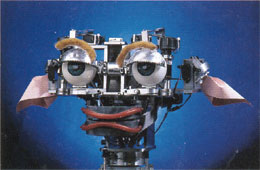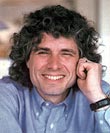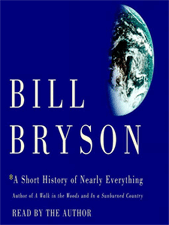Natural Sciences
Great Online links to science articles, books, and audio interviews

Reuben Abel's Man is The Measure
Evolution Debate: Science vs. Religion
Artificial Intelligence Articles by Ray Kurzweil and other noted scientists on the future of A.I.
Chat with Ramona an A.I.
Meet M.I.T.'s Kismet, the robot with emotions
The Day the Universe Changed : How Galileo's Telescope
Changed The Truth and Other Events in History That
Dramatically Altered Our Understanding of the World
Einstein's Dreams Alan Lightman
"Fantastic Journey: How Scientists Figured Out the Shape and
Size of the Earth" by Joy Hakim
A Short History of Nearly Everything Bill Bryson
Robotics Site (great site on robotics, the merging of machine
and man. Includes classroom activities)
Science
Friday Archives audio interviews on various scientific topics


Steven
Pinker check out link to
edge.org
videos of Pinker and
 Steven Pinker
Steven Pinker
Pinker's homepage at Harvard
Thomas Kuhn's Scientific Revolutions
The Origin, History, and Classifications of Science
Science
(Latin scientia, from scire, “to know”), term used to denote systematized knowledge in
any field, but applied usually to the organization of objectively verifiable
sense experience. The pursuit of knowledge in this context is known as pure
science, to distinguish it from applied science, which is the search for
practical uses of scientific knowledge, and from technology, through which
applications are realized.
Origins
of Science
Efforts
to systematize knowledge can be traced to prehistoric times. The oldest written
records of protoscientific investigations come from Mesopotamian cultures; lists
of astronomical observations, chemical substances, and disease symptoms, as well
as a variety of mathematical tables, were inscribed in cuneiform characters on
clay tablets. Ancient papyrus documents have been discovered in the Nile Valley,
containing information on the treatment of wounds, on the distribution of bread
and beer, and on finding the volume of a portion of a pyramid.
Rise
of Scientific Theory
Among the first Greek scholars to seek the fundamental causes of natural phenomena was the philosopher Thales, in the 6th century BC. The mathematician and philosopher Pythagoras established a movement in which mathematics became a discipline fundamental
to
scientific investigation. At the Academy of Plato,
deductive reasoning (see Deduction)
and mathematical representation were emphasized; at the Lyceum of Aristotle,
inductive reasoning and qualitative description were stressed. The interplay
between these two approaches to science has led to most subsequent advances (see Logic).
During
the so-called Hellenistic Age, foundations were laid for mechanics and
hydrostatics, botany, trigonometry,
and anatomy and physiology.
In the 2nd century AD the geocentric (earth-centered) system, advanced by the astronomer Ptolemy,
and the medical works of the physician and philosopher Galen
became standard scientific treatises.
Medieval
and Renaissance Science
During
the 13th century, Chinese innovations led to European processes for
manufacturing paper and gunpowder, and the use of printing and the mariner's
compass. In 1543 the Polish astronomer Nicolaus
Copernicus revolutionized astronomy, and
Belgian anatomist Andreas Vesalius corrected and
modernized the anatomical teachings of Galen. Vesalius's work led to the
discovery of the circulation of the blood.
Modern
Science
Italian
physicist and astronomer Galileo led the
development of modern scientific methods by systematic verification through
planned experiments, using new instruments such as the telescope,
the microscope, and the thermometer.
In 1687 English mathematician and physicist Isaac
Newton published his universal law of gravitation. The invention of calculus
led to today's sophisticated level of science and mathematics.
Confidence
in the scientific attitude inspired the so-called Age
of Enlightenment. Scientific developments during the 18th century paved
the way for some broad generalizations in science, including the atomic theory
of matter, theories of electromagnetism, and the law of the conservation of
energy (see Electromagnetic
Radiation; Energy; Thermodynamics).
Charles Darwin put forth evolution,
the most comprehensive biological theory of the time. But as biology
became more firmly based, physics was shaken by
the consequences of quantum theory and relativity.
Scientific
Communication
Throughout history, scientific knowledge has been transmitted chiefly through written documents. Since the Renaissance (14th century to 17th century) the fostering of scientific activity has been shared by universities and scientific societies. Governmental support of science led to the founding of the Royal Society of London (1662) and the Académie des Sciences de Paris (1666). During the 18th century academies of science, many of which publish journals, were established by other leading nations. Since the late 19th century, communication among scientists has been facilitated by the establishment of international organizations. The unions hold international congresses every few years, the transactions of which are usually published. Numerous major industrial firms also have research departments, some of which regularly publish accounts of their work.
The
pure natural sciences
are generally divided into the physical sciences and the biological sciences,
both of which can be subdivided.
The chief Biological Sciences are botany and zoology.
All classifications of the pure sciences, however, are arbitrary. In the
formulations of general scientific laws, interlocking relationships among the
sciences are recognized. These interrelationships are considered responsible for
much of the progress today in several specialized fields of research, such as molecular
biology and genetics. Several
interdisciplinary sciences, such as biochemistry,
have arisen. Advances can be the result of research by teams of specialists
representing different sciences, both pure and applied.[1]
The
Social Sciences are
sciences concerned with human society and the institutions, relationships, and
ideas involved in social life. Fields include anthropology,
sociology,
political science, economics,
history, law, psychology,
criminology, and social
psychology.[2]
[1]Encarta®
98 Desk Encyclopedia
© & 1996-97 Microsoft
Corporation.
All
rights reserved.
[2]Encarta®
98 Desk Encyclopedia
© & 1996-97 Microsoft
Corporation.
All
rights reserved.

